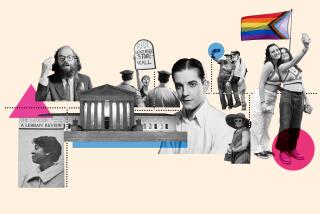Scapegoating of Gay Men Leaves Its Mark
- Share via
The AIDS epidemic has caused a resurgence of anti-homosexual sentiment throughout this country. Verbal and physical attacks on gay men have increased along with fears of the disease’s extension from the initially infected groups, gay men and intravenous-drug users. This kind of scapegoating of a distinctive minority is common whenever a majority feels threatened, frustrated and helpless.
Most often we hear the spread of AIDS in this country blamed on the promiscuity of gay men, even though there is abundant evidence of long-term homosexual relationships. This pernicious stereotype of sexual excess has been directed at one time or another against virtually all minorities feared because of their differences.
When gay men do engage in random sexual activity, it is for reasons that may range from personal psychological to social factors. The more closeted a gay man needs to be for reasons of job, marital status or religion, the more likely he is to engage in certain types of anonymous sexual activity. The more comfortable a gay man is about himself as a homosexual, and the better integrated his homosexuality is in the total context of his personality and life, the more able he will be to establish long-term loving relations. The strictures that society places on the loving expressions of homosexual behavior, and the hatred that gay men experience, encourage some to identify with the view that their sexuality is simply a matter of lust.
The injury to a homosexual man’s self-esteem often begins in childhood. The homosexually inclined boy usually feels himself to be different because of his same-sex fantasies and feelings, which are present from an early age. Some experience early rejection by their parents, particularly their fathers, because they don’t act like “typical” boys. Some are rejected by their fathers because they wish for an emotional closeness that may make the father uncomfortable. Having grown through childhood and adolescence feeling like outsiders, many gay men carry with them throughout their lives a poor self-image and low self-esteem.
The AIDS epidemic is adding yet another dimension to the self-esteem problems of gay men in our society, particularly the more impressionable young. I see some young adults who perceive themselves now not only as bad and immoral but also as potential carriers of death. They may be inhibited from expressing their sexuality at all, even within public-health guidelines, and they may find it impossible to develop a sense of themselves as men capable of a full and responsive sexuality in close and loving relationships. This attitude does not produce gay men who, as some might wish, are turning from homosexuality to heterosexuality, but gay men who, feeling worse about themselves, may turn to corrosive fantasies and behavior as an expression of their sexuality.
During this time, many physically healthy men are seeking help from psychotherapists. They come with problems in day-to-day living that affect gay men and heterosexuals alike, and with the particular problems that they have in living in a prejudiced society. And they come for help with the anxieties associated with acquiring AIDS, anxiety that is realistic but also possibly complicated by unconscious feelings about their homosexuality and themselves as gay men.
Prejudice is prevalent in some sectors of the mental-health community, just as it is in society as a whole, and has caused many therapists to confuse health ethics with moral values. Failing to take into account the accumulating evidence that homosexuality has an essential inherited or constitutional component, many therapists are convinced that it is a childhood turning away, because of emotional trauma, from the “correct” pathway--heterosexuality.
A clinical theory has quite naturally evolved from this view of early developmental disturbance. It is a view that homosexuals should be heterosexual if they are to live full, productive lives. This heterosexual bias leads even therapists attempting to be neutral to make comments that further undermine the self-esteem of gay men. Because of AIDS, an increasing number of therapists may be admonishing their patients to become heterosexual. These efforts to change sexuality place an increasing burden on the self-esteem of gay men, and may cause other psychological damage as well.
It is impossible to sustain intimacy without a sense of self-worth. It will take a great effort for gay men to maintain their self-esteem and dignity in a society that appears to be growing increasingly inimical to them and their sexuality. It will take an even greater effort and conviction at this time for our society to support the sense of self-worth and emotional health of gay men by sanctioning loving relationships of all kinds, and by attempting to ensure, not constrict, their civil liberties and rights.
More to Read
Sign up for Essential California
The most important California stories and recommendations in your inbox every morning.
You may occasionally receive promotional content from the Los Angeles Times.










